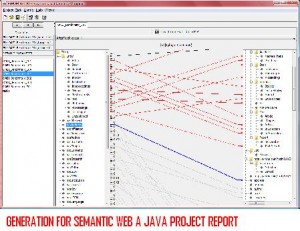The Semantic Web Java Project intends to create a universal medium for information exchange by putting documents with computer-processable meaning (semantics) on World Wide Web in a standardized way. 
Capability of semantic web:
Semantic Web is capable of integrating the day-to-day mechanisms of trade, bureaucracy and our daily lives so that they will be handled by machines talking to machines, making them intelligent agents.
Ontology is a conceptualization of a domain into a human understandable, machine-readable format consisting of entities, attributes, relationships, and axioms. It is used as a standard knowledge representation for the Semantic Web. Ontology is an effective conceptualism commonly used for the Semantic Web. Fuzzy logic can be incorporated to ontology to represent uncertainty information. Typically, fuzzy ontology is generated from a predefined concept hierarchy. However, to construct a concept hierarchy for a certain domain can be a difficult and tedious task.
Tackling problems:
To tackle this problem, this paper proposes the FOGA (Fuzzy Ontology Generation framework) for automatic generation of fuzzy ontology on uncertainty information.
FOGA Framework:
The FOGA framework comprises the following components: Fuzzy Formal Concept Analysis, Concept Hierarchy Generation, and Fuzzy Ontology Generation.
We also discuss approximating reasoning for incremental enrichment of the ontology with new upcoming data. Finally, a fuzzy-based technique for integrating other attributes of database to the ontology is proposed.
Currently there is much data on our computers which we cannot browse, or process by, including personal data like calendars, play lists, GPS coordinates, bank statements; enterprise product and work flow and resources; and public data such as weather, events and the properties of materials.
Why FOGA?
The proposed FOGA framework would be useful to construct ontology from uncertainty data as it can represent uncertainty information and construct a concept hierarchy automatically.
Proposed a technique is to integrate extra attributes in a database to the ontology.
Advantage:
Its advantage is fully unsupervised ontology generation even from uncertainty information in the context.
Conclusion:
In this project we have proposed the FOGA framework for fuzzy ontology generation on uncertainty information. FOGA consists of the following steps: Fuzzy Formal Concept Analysis, Fuzzy Conceptual Clustering, Fuzzy Ontology Generation, and Semantic Representation Conversion.
In addition, we have also proposed an approximating reasoning technique that allows the generated fuzzy ontology to be incrementally furnished with new instances. Finally, we have also proposed a technique to integrate extra attributes in a database to the ontology.
download Project Report and sample code of CSE Semantic Web Java Project .

Can you please provide the source code for this project.